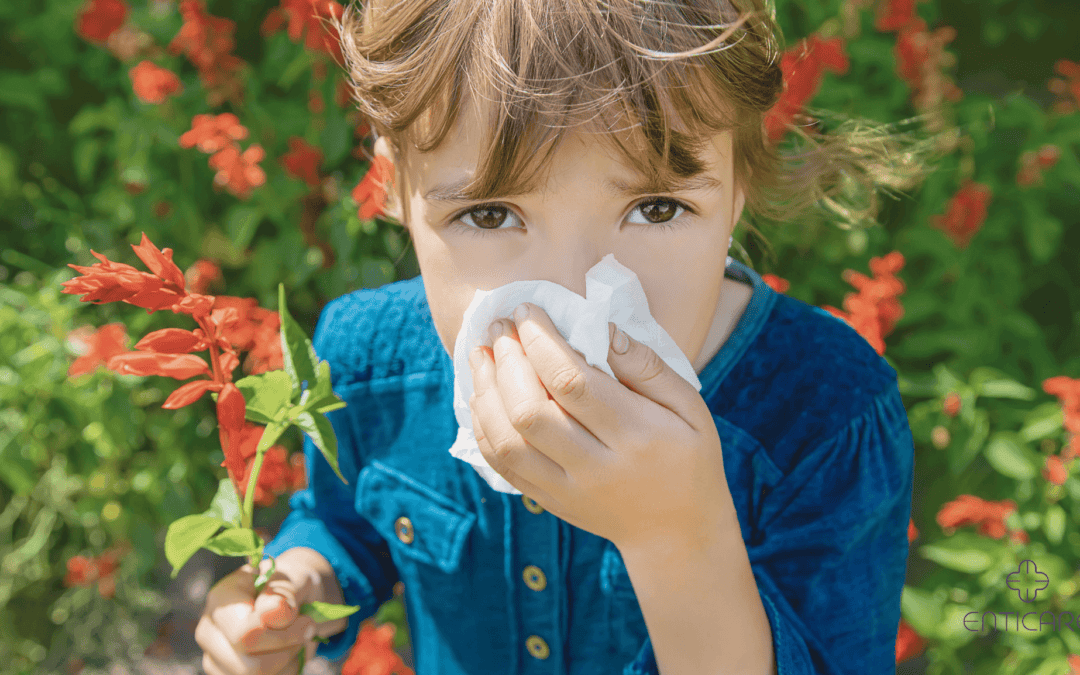Do you find yourself sneezing, congested, and dealing with watery eyes no matter the season? Unlike seasonal allergies, often referred to as hay fever, which is triggered by outdoor allergens like pollen, year-round allergies are caused by indoor allergens. If your allergies seem to last all year long, you’re not alone. Many people experience perennial (year-round) allergies, which can disrupt daily life and lead to chronic discomfort. Persistent allergies can also lead to chronic sinusitis, which further complicates the condition. But why does this happen? Understanding the triggers, symptoms, and underlying causes of year-round allergies can help you manage your symptoms more effectively.
Understanding Year-Round Allergies
What are Year-Round Allergies?
Year-round allergies, also known as perennial allergies, are a type of allergy that occurs throughout the year, regardless of the season. Unlike seasonal allergies, which are triggered by outdoor allergens like pollen, year-round allergies are typically caused by indoor allergens such as dust mites, pet dander, mold, and cockroaches. These airborne allergens can be present in the home, workplace, or other indoor environments, making it difficult to avoid them. Dust mites thrive in bedding and upholstered furniture, pet dander can linger in the air and on surfaces, and mold can grow in damp areas like bathrooms and basements. Because these allergens are constantly present, they can lead to persistent allergy symptoms, making it feel like allergy season never ends.

What Causes Year-Round Allergies?
Several factors can contribute to allergies that persist throughout the year. Knowing the main triggers can help you take control of your symptoms and improve your quality of life. These allergens can cause nasal allergy symptoms such as congestion, sneezing, and itchy eyes, which persist throughout the year. Effective allergy management involves identifying and minimizing exposure to these triggers.
Indoor Allergens: A Common Culprit
Unlike seasonal allergies, which are often triggered by outdoor pollen, perennial allergies are typically caused by indoor allergens like dust mites, pet dander, mold, and cockroach droppings. These allergens are present in the environment all year, making them a constant source of irritation for those who are sensitive. In some cases, nasal polyps, which are abnormal growths inside the nose and sinuses, can exacerbate these symptoms and make treatment more challenging. Indoor air pollution can exacerbate the effects of these allergens.
Food Allergies: A Hidden Trigger
While food allergies are not typically associated with year-round allergies, they can be a hidden trigger for some people. Certain foods, such as dairy, gluten, or soy, can cause an allergic reaction, leading to symptoms like nasal congestion, runny nose, and itchy eyes. These symptoms can be mistaken for other types of allergies, making it challenging to identify the true cause. If you suspect that a food allergy is contributing to your year-round allergy symptoms, consult with an allergist or healthcare professional for proper diagnosis and treatment. They can help you determine if a specific food is triggering your symptoms and guide you on how to manage your diet to reduce allergic reactions. An elimination diet can help identify specific food triggers contributing to year-round allergy symptoms.
Environmental Factors: Pollution and Weather
Environmental factors like pollution and weather can also exacerbate year-round allergy symptoms. Airborne pollutants, for example, can irritate the nasal passages and lungs, making allergy symptoms worse. Pollutants such as car exhaust, industrial emissions, and cigarette smoke can all contribute to increased allergy symptoms. Weather changes, such as humidity and temperature fluctuations, can also trigger allergy symptoms. High humidity can promote mold growth, while dry air can irritate the nasal passages. Understanding how environmental factors impact your allergies can help you take steps to mitigate their effects. For instance, using air purifiers, maintaining proper indoor humidity levels, and avoiding outdoor activities during high pollution days can help reduce your exposure to these triggers.
Allergic Reaction and Rhinitis
What is an Allergic Reaction?
An allergic reaction occurs when the immune response overreacts to a harmless substance, such as an allergen. When an allergen enters the body, the immune system releases histamine and other chemicals to fight it off, leading to a range of symptoms. One common manifestation of an allergic reaction is allergic rhinitis. Allergic rhinitis is characterized by nasal congestion, runny nose, sneezing, and itchy eyes. It can be triggered by a variety of allergens, including dust mites, pet dander, mold, and pollen. When these allergens are inhaled, they can cause inflammation in the nasal passages, leading to the typical symptoms of allergic rhinitis. Understanding the nature of allergic reactions and the role of the immune system can help you better manage your symptoms and seek appropriate treatment.

Symptoms of Perennial Allergies
Understanding the symptoms of year-round allergies can help you identify your triggers and seek appropriate treatment. While they may mimic seasonal allergies, the persistence of these symptoms is what sets them apart. Common allergic rhinitis symptoms include nasal congestion, runny nose, sneezing, and itchy eyes, which can persist throughout the year. Chronic inflammation from persistent allergies can lead to more severe health issues over time.
Chronic Congestion and Sinus Pressure
One of the most common symptoms of year-round allergies is nasal congestion. This can lead to sinus pressure, frequent headaches, and difficulty breathing through the nose. Persistent congestion often disrupts sleep and can result in fatigue during the day.
Chronic congestion can also lead to sinusitis, which may require medical treatment.
Itchy Eyes, Nose, and Throat
Itchy, watery eyes are often a sign of allergies, but if the itching persists beyond allergy season, it may indicate a reaction to indoor allergens. You may also experience an itchy nose and throat, leading to frequent sneezing or coughing.
Persistent itchy eyes may indicate allergic conjunctivitis, which can be treated with specific medications.
Skin Reactions
Some people with year-round allergies develop skin issues like eczema or hives. These reactions may occur when exposed to allergens like pet dander, dust mites, or certain chemicals. Chronic skin irritation can be frustrating and affect your comfort and confidence. Contact dermatitis can occur when the skin comes into direct contact with allergens.

Common Triggers of Year-Round Allergies
Identifying your allergy triggers is key to managing your symptoms. Here are the most common culprits of year-long allergies.
Minimizing allergen exposure is key to managing year-round allergy symptoms.
Dust Mites
Dust mites are microscopic creatures that thrive in warm, humid environments, particularly in bedding, upholstered furniture, and carpets. They are one of the leading causes of year-round allergies, causing symptoms like sneezing, itchy eyes, and nasal congestion.
Pet Dander
Even if your pet doesn’t shed much hair, their skin flakes (dander), saliva, and urine can trigger allergic reactions. Cat and dog dander are particularly common allergens, but birds and other household pets can also cause issues.
Using HEPA filters in your home can help reduce airborne pet dander.
Mold
Mold grows in damp, dark places such as bathrooms, basements, and kitchens. Mold spores can become airborne, leading to allergic reactions when inhaled. If you live in a humid climate, mold growth may be a year-round problem in your home.
Professional mold remediation may be necessary to effectively remove mold from your home.
When to See a Doctor
If your allergies are affecting your quality of life, it’s time to seek professional help. Chronic allergies can lead to other health issues if left untreated. Consulting an allergy specialist can provide you with a personalized treatment plan.
Recurrent Sinus Infections
Chronic nasal congestion caused by allergies can lead to sinus infections. If you experience recurring sinus infections, pressure, or pain in your face, it’s time to see a doctor. Long-term sinus problems can affect breathing and sleep quality. In severe cases, sinus surgery may be necessary to alleviate chronic sinus infections.
Persistent Asthma-Like Symptoms
For some, year-round allergies can trigger asthma-like symptoms, including wheezing, coughing, and shortness of breath. If you experience these symptoms, even if only occasionally, consult a healthcare professional for an evaluation.
Effective asthma management can help control symptoms triggered by year-round allergies.
No Relief from Over-the-Counter Medications
If over-the-counter allergy medications don’t provide relief or cause side effects, your doctor can prescribe prescription medications or suggest alternatives like allergy shots or sublingual immunotherapy.
Embrace a Healthier Lifestyle
Living with allergies requires a proactive approach to managing your symptoms and avoiding triggers. By understanding your allergies and taking steps to prevent exposure, you can reduce your symptoms and improve your quality of life.

